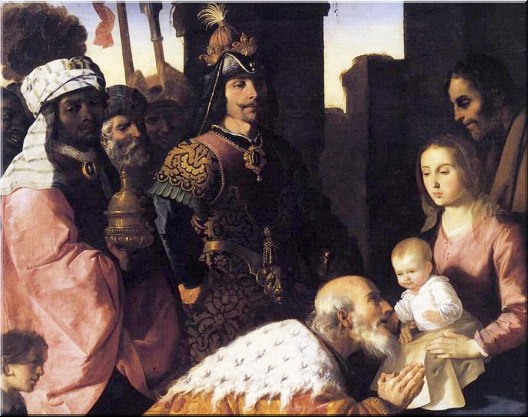Three Kings Day -Dia de Reyes-
Defining Puerto Rican Culture
 by
Don Jibaro Orlando
by
Don Jibaro Orlando
In
the early 1950s, I didn't know about Santa Clós in Bayamón,
Puerto Rico, the town where I grew up. We had THREE KINGS!!!
I would leave a shoebox by my bedside every Jan. 5, filled
with grass. According to tradition, three kings would come
to my house in the middle of the night and leave presents in
it. As many of the other Boricua kids, I believed the camels
would actually eat the grass.
There was much anxiety in the "barrio" the night of the
5th... and needless to say, we went to bed with much
anticipation. What if I left my toes uncovered, too close to
the edge of the bed and the camels chewed on them, or...
what if they pooped on my floor… inside the box? Or worse...
what if the Three Kings missed my house altogether? Ay,
Bendito! The HORROR!!!
I, for one, never thought that the observance of Los Tres
Reyes Magos, or three "magician" kings, would end. Even
though I moved to the United States when I was 24, Santa
Claus NEVER replaced the Three Kings. Even as the years have
gone by, now that I am fifty plus years older, and somewhat
immersed in the American culture, I have taught my children
the wonderful tradition of Los Tres Reyes Magos.
So... allow me give you a bit of background on this so
important very part of PuertoRicana...
Yes, there are twelve days of Christmas and they begin on
Christmas Day and end on January 6. The twelve days of
Christmas end with the Feast of Epiphany also called "The
Adoration of the Magi" or "The Manifestation of God."
Celebrated on January 6, it is known as the day of the Three
Kings (or wise men/magi): Gaspar, Melchor and Baltazar.
According to a Bible story, these three kings saw, on the
night when Christ was born, a bright star, followed it to
Bethlehem and found there the Christchild and presented Him
with gold, frankincense and myrrh.

The Magi are
popularly referred to as wise men and kings. The word Magi
is a Latinization of the plural of the Greek word magos (μαγος
pl. μαγοι), itself from Old Persian maguŝ from the Avestan
magâunô, i.e. the religious caste into which Zoroaster was
born, The term refers to the priestly caste of
Zoroastrianism. As part of their religion, these priests
paid particular attention to the stars, and gained an
international reputation for astrology, which was at that
time highly regarded as a science. Their religious practices
and use of astrology caused derivatives of the term Magi to
be applied to the occult in general and led to the English
term magic.
January 6, the last day of Christmas,
comes with its own traditions, rituals and symbols. Carolers
are going from house to house; in many homes the Christmas
tree is taken down and in some areas is burned in a big
bonfire. For the children this is an especially joyous
occasion because, associated with taking down the tree goes
the "plündern" (raiding) of the tree. The sweets, chocolate
ornaments wrapped in foil or cookies, which have replaced
the sugar plums, are the raiders' rewards.
The history of Christmas, (the festival
of the nativity of Jesus Christ,) is intertwined with that
of the Epiphany. The commemoration of the Baptism (also
called the Day of Lights, i.e. the Illumination of Jesus)
was also known as the birthday of Jesus, because he was
believed to have been born then of the Virgin or reborn in
baptism. In some records Christmas and Epiphany were
referred to as the first and second nativity; the second
being Christ's manifestation to the world.
“I never became so Americanized that I forgot where I came
from,” I told a friend recently. “Inasmuch as my peers did
not celebrate the same holiday (they did the "Santa" thing),
it was not for me to abandon such a rich and rewarding
custom.” I believe that as Puerto Ricans… "ausentes" living
away from the Island, it is imperative that we revive the
Three Kings holiday and other Puerto Rican traditions with
our families. It’s just part of our roots.

California Ricans in L.A. play the 3 Kings




DIG THIS.... besides the ancient lyre, the cuatro
was the only instrument that has 10 strings.
"Praise the LORD with harp: sing unto
him with the
psaltery and an instrument of ten strings." (Psalms 33:2))

Dios los bendiga!
